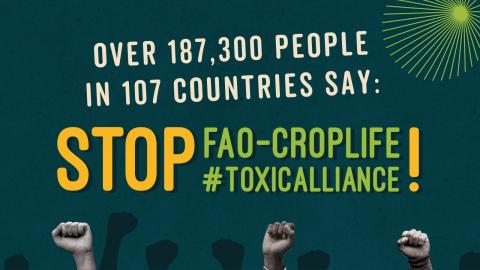FAO should end its partnership with CropLife

Gothenburg, Sweden Today, civil society and indigenous peoples organizations delivered more than 187,300 petition signatures from over 107 countries to the United Nations Food and Agriculture Organization (FAO) Director-General Qu Dongyu, demanding that the FAO end its partnership with CropLife International, an international lobbying association for the world’s largest agrochemical companies.
In the petition, advocates argued that it is “deeply inappropriate” for the UN agency to partner with CropLife, whose member companies (Bayer, Syngenta, Corteva Agriscience, FMC, and Sumitomo) make around one-third of their sales from Highly Hazardous Pesticides (HHPs), or pesticides that pose the highest levels of risk to health and the environment.
Recent estimates show that there are 385 million cases of acute unintentional pesticide poisonings each year, up from an estimated 25 million cases in 1990. “This means that about 44% of farmers and agricultural workers around the world are poisoned each year by an industry dominated by CropLife members,” the petition said. (Click here and scroll down for a copy of the petition)
PAN Europe, along with other organizations, held a mobilization in front of the FAO headquarters in Rome to accompany the petition delivery and to mark the anniversary of the Bhopal tragedy, also commemorated as World No Pesticide Use Day. Advocates from around the world also participated in a Global Day of Action, including placard protests and a social media rally urging the FAO to stop the #ToxicAlliance.
“FAO is a public institution that is not supposed to serve the needs of the private sector, whose aim is to sell pesticides. In Ethiopia, we have seen the economic damage and debt a pesticide-dependent system has created. More importantly, we have benefited from ending the use of pesticides, in working with farmers applying agroecology / pesticide free farming techniques. This has improved the local economy, and protected women and children threatened by the toxic harm and legacy of pesticides,” said Dr. Tadesse Amera, IPEN Co-Chair and Director of Pesticide Action Nexus Ethiopia.
“The registration and use of Highly Hazardous Pesticides in Latin America and the Caribbean is a big concern in the region, as IPEN country situation reports have shown in Mexico, Costa Rica, Jamaica, Chile, Argentina, Panamá, Paraguay, and Brazil, with acute and chronic damaging health effects and negative impacts in the environment” said Fernando Bejarano, IPEN’s regional coordinator for Latin America and the Caribbean and member of the Pesticide Action Network in Latin America, who adds “it is time to promote and invest in agroecological alternatives and transform the food systems to support workers and indigenous rural communities instead of transnational pesticide corporations.”
“The partnership between the FAO and CropLife will undermine all efforts made in Africa to ban dangerous pesticides, and will leave the door open to the export of pesticides banned in Europe such as atrazine, paraquat, etc. We denounce and strongly reject this ‘Toxic Alliance’ as it is beset with conflict of interests not known to the public, to the detriment of health protection and environmental preservation,” said Maimouna Diene, coordinator of PAN Africa.
“The alliance between FAO and CropLife implies a greater influence on public policies by the companies that manufacture and sell pesticides, especially in the most vulnerable countries where the expansion of monocultures and the use of Highly Hazardous Pesticides is favored, which impacts socio-environmental health. On the contrary, FAO and governments should favor agroecological production as the basis of a comprehensive link with the environment to achieve food sovereignty,” said Javier Souza, Regional Coordinator of PAN Latin America (RAPAL).
“We cannot expect that partnering with an association of hundreds of subsidiaries to multinational giants like Bayer and Syngenta –who have vested interests in increasing the sales of their products-- will support FAO’s own goals of reducing reliance on pesticides. It is incompatible with FAO’s mandate as a UN institution to protect human rights, including the right to a clean, healthy and sustainable environment, which the UN Human Rights Council just recently recognized,” said Simone Adler, Organizing Co-Director of PAN North America.
The global petition delivery follows letters of appeal submitted by over 350 international civil society and Indigenous peoples’ organizations and 250 scientists and academics last year, after the signing of the partnership agreement between FAO and CropLife in October 2020. A coalition of 11 global organizations, including PAN, followed up with a formal request to meet with Director-General Qu to discuss their concerns, but has not received a response to date.
“It is alarming how big business dominates in setting the direction of policymaking, as we have seen with the corporate capture of the UN Food Systems Summit. We expect that CropLife will take full advantage of this partnership with FAO to expand and consolidate corporate control over food and agriculture. We cannot just take it sitting down,” said Sarojeni Rengam, Executive Director of PAN Asia Pacific.
IPEN (International Pollutants Elimination Network) is a global environmental network of over 600 public interest NGOs in 128 countries, working to eliminate and reduce the most hazardous substances to forge a toxics-free future for all. IPEN is registered in Sweden as a public interest non-profit organization. www.ipen.orgRAPAM (Red de Acción sobre Plaguicidas y Alternativas en México) is a non-profit Mexican civil association that works to phase out chemical pesticides that affect human health and the environment and promote agroecological alternatives. www.rapam.org
Pesticide Action Nexus Association of Ethiopia (PAN-Ethiopia) is a non-governmental organization registered in Ethiopia is working to prevent the public health and environmental impacts of pesticides and other hazardous substances in Ethiopia and beyond.
Media contacts
Ilang-Ilang Quijano, PAN Asia Pacific, ilang.quijano@panap.net
Fernando Bejarano, IPEN Hub for Latin America and Caribbean and Mexico PAN Latin America (RAP-AL) member. coordinacion@rapam.org
Javier Souza Casadinho, PAN Latin America (Spanish), javierrapal@yahoo.com.ar
